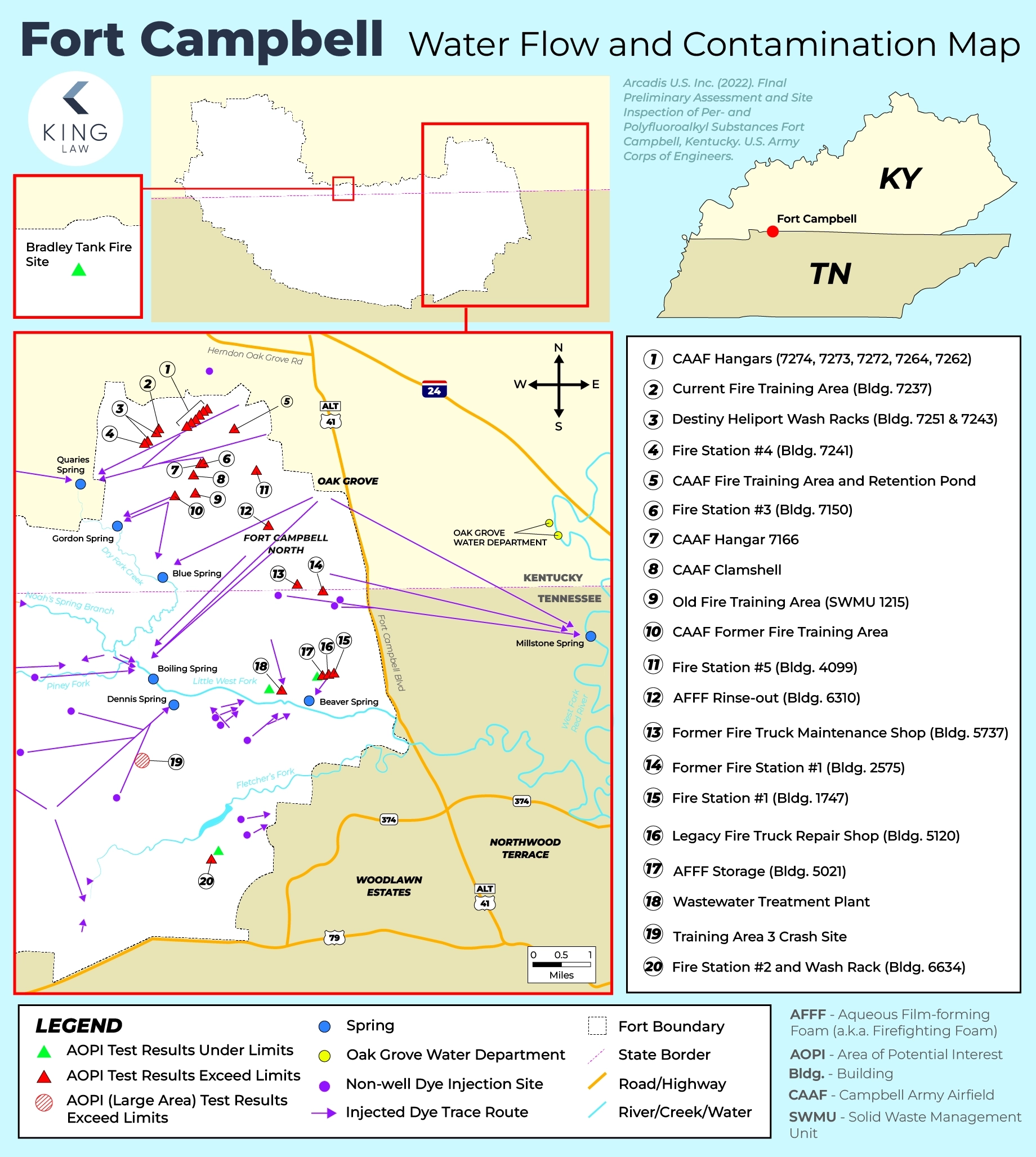
Fort Campbell Water Contamination Lawsuit Overview
Fort Campbell is located along the Kentucky and Tennessee border. It is home to the Army’s only Air Assault unit, the Screaming Eagles of the 101st Airborne and the 160th Special Operations Aviation Regiment. The base is between the communities of Hopkinsville, Kentucky, and Clarksville, Tennessee. It was originally built in 1941 and is one of the largest military bases in the country.
Recently, it was discovered that the water at Fort Campbell was contaminated with per- and polyfluoroalkyl substances (PFAS). The “forever chemicals” are toxic to humans, animals, and the environment. The discovery of contamination at the site led to it being designated a superfund site. Individuals who were diagnosed with cancer or another adverse health condition after being stationed or working at Fort Campbell are encouraged to contact King Law for a free consultation.
Fort Campbell Water Contamination Lawsuit Updates
April 9, 2024: A study released by the Kentucky Department for Environmental Protection, Division of Water, suggests contamination from Fort Campbell. In the study, the highest PFAS levels in the state came from Christian County, where Fort Campbell is located in southern Christian County.
March 2024: Investigations and potential litigation initiated alleging water contamination at Fort Campbell.
November 2023: Sampling at Fort Campbell military base by the Environmental Working Group indicates the groundwater is contaminated with PFAS chemicals, exposing current and former service members to potentially dangerous toxins.
On this page:
Historical Background of Toxic Exposure at Fort Campbell
Fort Campbell Water Contamination Map
Contaminants Found in Fort Campbell Drinking Water
Current Water Quality at Fort Campbell
Health Risks Connected to Drinking Water at Fort Campbell
Eligibility Criteria for a Fort Campbell Water Contamination Lawsuit
Fort Campbell Water Contamination Settlement Amounts
How to File a Fort Campbell Water Contamination Lawsuit
Statute of Limitations for Fort Campbell Water Contamination Cases
Historical Background of Toxic Exposure at Fort Campbell
In November 2023, the Environmental Working Group (EWG), a 501(c)(3) nonprofit corporation, released findings that drinking water and groundwater at Fort Campbell were contaminated with a number of toxins, including per- and polyfluoroalkyl substances, or PFAS. PFAS are potentially cancer-causing “forever chemicals.” PFAS levels discovered in groundwater on the base were exponentially higher than those accepted by the Environmental Protection Agency (EPA).
PFAS levels detected in groundwater at Fort Campbell:
- PFOS – level detected 3,700
- PFAS – level detected 2,200
- PFBS – level detected 460
The EPA’s previous acceptable threshold was 70 parts per trillion. New regulations are moving forward to reduce the threshold to no more than 4 parts per trillion. In addition to PFAS, there were several other contaminants present in the water, including chloroform and bromodichloromethane.
Fort Campbell Water Contamination Map
Studies show that PFAS and other toxic chemicals are present in the groundwater and wells on or near Fort Campbell. It is believed that the military’s widespread use of Aqueous Film-Forming Foam (AFFF), a PFAS-containing fire suppressant, may have contaminated the groundwater throughout the base. AFFF was used for decades on bases throughout the U.S. Areas being assessed include the Current Fire Training Area (FTA) Building 7237, Former Fire Station, Fire Station #3 Building 7160, and other areas throughout the installation.

Contaminants Found in Fort Campbell Drinking Water
Testing of groundwater at Fort Campbell indicates high levels of per- and polyfluoroalkyl Substances (PFAS) and other contaminants. Many of these toxins have been linked to an increased risk of cancer.
Contaminants detected in Fort Campbell drinking water:
- PFAS “forever chemicals”
- Bromodichloromethane
- Chloroform
- Chromium (hexavalent)
- Dibromochloromethane
- Haloacetic acids (HAA5)
- Haloacetic acids (HAA9)
- Tetrachloroethylene (perchloroethylene)
- Total trihalomethanes
The chemicals detected were at levels that may be considered dangerous to human health. Individuals who were stationed at Fort Campbell are encouraged to get regular health screenings to ensure any potentially adverse health conditions are promptly diagnosed and treated. Affected individuals may be eligible to file a lawsuit and should speak to an experienced attorney as soon as possible.
Current Water Quality at Fort Campbell
The United States Army regularly conducts tests to detect common PFAS, such as PFOS and PFOA, in the drinking water at Fort Campbell. In August 2023, a sampling of drinking water on the base found PFOA + PFOS levels of 33.7 parts per trillion, significantly above the 4 ppt recommended by the EPA.
Water Treatment Efforts at Fort Campbell
While Fort Campbell is designated a Superfund Site, it is not on the National Priorities List, so cleanup efforts are limited. However, the Army indicates that the base is in the Final Preliminary Assessment and Site Inspection of Per- and Polyfluoroalkyl Substances. Preliminary assessments began in 2018, and many areas throughout the base are in the remedial investigation phase.
Health Risks Connected to Drinking Water at Fort Campbell
Contaminants detected in the water at Fort Campbell have been linked to several dangerous health conditions, including cancer, when consumed by humans. PFAS exposure, in particular, has both short- and long-term health risks. Individuals who were stationed at Fort Campbell should engage in regular health check-ups and screenings to detect any illnesses related to contaminated drinking water.
Health risks related to PFAS exposure:
- Bladder cancer
- Testicular cancer
- Kidney cancer
- Leukemia
- Prostate cancer
- Thyroid cancer
- Liver cancer
- Pancreatic cancer
- Ulcerative colitis
- Non-Hodgkin’s lymphoma
- Thyroid disease
Our law firm is currently evaluating cases where individuals have been diagnosed with:
- Kidney Cancer
- Liver Cancer
- Prostate Cancer
- Testicular Cancer
- Thyroid Cancer & Thyroid Disease
- Ulcerative Colitis
If you have been diagnosed with cancer or another illness related to PFAS exposure, you may be eligible to file a lawsuit. It is important to consult with an attorney immediately to determine the best course of action.
Eligibility Criteria for a Fort Campbell Water Contamination Lawsuit
To file a Fort Campbell contamination lawsuit, you must meet the necessary eligibility criteria. Qualifications may include proof of residence or service at Fort Campbell and proof of PFAS exposure-related condition. Successful lawsuits may be based on the duration of exposure, generally at least 6 months, and a specific diagnosis related to PFAS exposure, such as thyroid disease or certain types of cancer.
Eligibility criteria for a Fort Campbell water contamination lawsuit may include:
- Proof of service – You will need to be able to provide military records showing you were stationed or worked at Fort Campbell for a period of time.
- Proof of injury – You will need to provide medical records showing that you have an injury caused by exposure to toxic chemicals found at Fort Campbell.
Our law firm is currently evaluating cases where individuals have been diagnosed with:
- Kidney Cancer
- Liver Cancer
- Prostate Cancer
- Testicular Cancer
- Thyroid Cancer
- Thyroid Disease
- Ulcerative Colitis
Fort Campbell water contamination lawsuits may take from several months to a year or more to resolve. Consulting with an attorney can help provide the necessary guidance throughout the process. It can also help ensure that you have realistic expectations about the timeline and potential outcome of the lawsuit.
Fort Campbell Water Contamination Settlement Amounts
While settlement amounts in a Fort Campbell water contamination lawsuit may vary from case to case, it is anticipated that payouts may be between $30,000 and $500,000. Factors that may influence a settlement amount may include the duration of exposure, the ability to prove a link between adverse health conditions and PFAS exposure, and out-of-pocket expenses.
Previous cancer-related lawsuits generally settled for amounts between $100,000 and $300,000. The average settlement in a Fort Campbell water contamination case is expected to be approximately $250,000 but will depend on several factors. Individuals who receive a cancer diagnosis at a younger age may receive a larger payout. There is the potential for some cases to reach values of $1,000,000 or more.
Individuals with minor injuries or less proof of a connection between their diagnosis and water contamination at Fort Campbell may have a case value between $30,000 and $75,000. Settlements are frequently less than a potential trial verdict; however, there are no guarantees if the matter goes to a verdict.
How to File a Fort Campbell Water Contamination Lawsuit
In order to file a Fort Campbell water contamination lawsuit, you need to speak with an attorney as soon as possible. Many lawsuits are based on evidence. An attorney can help determine what evidence is needed to support your claim.
Evidence to Support Your Claim:
Successful Fort Campbell water contamination lawsuits often require evidence to support their claims. Working with legal counsel can help ensure you gather the necessary documents and information to prove your case.
Evidence to help support your claim:
- Environmental studies
- Water sample testing
- Medical records
- Military orders
- Expert testimony
Without the help of an attorney, you may end up settling your case for less than it is worth or for nothing at all. A lawyer who is well-versed in water contamination claims can help make sure that you receive the largest possible recovery based on the circumstances of your case.
Statute of Limitations for Fort Campbell Water Contamination Cases
All water contamination lawsuits are subject to a statute of limitations or a legal timeframe in which your case must be filed. Statutes of limitations are state-specific. Failure to file within the statute of limitations may result in your claim for damages being denied. The length of time you have to file a case depends on the jurisdiction where you file and the specifics of your claim.
It is important to consult with an attorney as early as possible to ensure you file within any legal deadlines that may apply to your case.
Fort Campbell Water Contamination Lawyers
Were you diagnosed with cancer or thyroid disease after being stationed at Fort Campbell? At King Law, we have extensive experience handling PFAS and military base water contamination lawsuits. We will help you understand your rights and work to ensure you receive the outcome you deserve. Contact our office today to get started.
Frequently Asked Questions (FAQs)
Read our frequently asked questions about Fort Campbell’s contaminated water.

